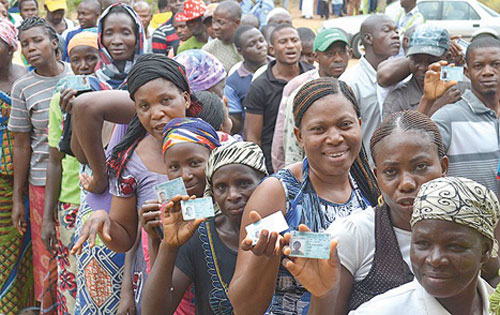…Stakeholders blame government • How to get out of quagmire — The Patriots, Adeniran, Shittu, others • It’s loss of confidence, trust in nation’s electoral process — Wale Okunniyi
THERE is rising concern among stakeholders over the steady decline in voter turnout during successive elections after 26 years of the nation’s return to civil rule.
Available statistics obtained by the Nigerian Tribune on the seven successive general elections conducted since 1999 confirmed a serious downward slide in the turnout after the 1999 elections that led to exit of the military from power.
Ironically, the nation has witnessed a geometric rise in the number of voters in the periodic register compiled by the Independent National Electoral Commission (INEC).
The data on voter turnout in the 1999 elections was 52.3 per cent, but the performance rating shot to 69 per cent in 2003, only for the rate to begin a steady dip from 57.5 per cent in 2007 to 53.7 per cent in 2011, 43.7 per cent in 2015, 34.8 per cent in 2019 and 28.63 per cent in the 2023 general election.
Conversely, the number of voters in the INEC register spanning the same periods showed a total of 57, 938,945 for 1999; 60,823,022 (2003); 61,567,036 (2007; 73, 528, 040 (2011); 68,833,476 (2015); 84, 004, 084 (2019) and 93,469,008 voters in 2023.
While the number of prospective voters rose astronomically, the swing has not translated into more voters’ turnout, even in offseason elections like governorship polls in Bayelsa, Osun, Ekiti, Ondo, Kogi and Anambra states.
Speaking to the Nigerian Tribune on the rising scale of poor turnout of voters, a former Minister of Education, Professor Tunde Adeniran blamed the trend on trust deficit occasioned by poor governance by the political class.
“The bottom line is the failure of the political class to meet the expectations of the people, resulting in trust deficit,” he said.
On the way forward, the former Nigerian envoy added: “The solution lies in leadership at all levels becoming more people-oriented, transparent, conscientious, creative, responsive and accountable.” The secretary of The Patriots, the organisation comprising eminent citizens, Comrade Wale Okunniyi, equally blamed the sustained slide in voter turnout to the loss of public confidence in the nation’s electoral system.
“Governance in Nigeria has not helped the lots of Nigerians. Many Nigerians have been impoverished and pauperised since the return of democratic rule, while the votes of the people have not counted as elections have been deemed rigged and manipulated by politicians
“For the confidence of Nigerians to be restored in democratic rule and elections in Nigeria, the Tinubu regime must immediately adopt the late President Umaru Yar’Adua approach by immediately setting up a Presidential Committee on Constitutional and Electoral Reforms of credible versatile Nigerians, like the Uwais Reform Panel of the Yar’Adua government, to urgently drive very critical political and electoral reforms for the country and thereafter reconstitute the INEC with perceived credible non partisan elements like Yar’Adua did by reconstituting INEC under the leadership of Professor Attahiru Jega.
“Above all, Tinubu must immediately hearken to massive yearning of Nigerians for a new democratic legitimate people’s constitution to replace the problematic crisis-inflicting military Decree 24 of 1999, dubiously tagged by the military as 1999 constitution. Outside these there’s no other way of restoring the hope of Nigerians in democracy and its concomitant electoral process,” he said.
On his part, a member of the Board of Trustees of the Arewa Consultative Forum (ACF), Mr Anthony Sani, was on the same page with Professor Adeniran and Comrade Okunniyi on the increasing decline in voters going out to exercise their franchise on election days.
“The voters turnout is progressively low every election circle may be due to loss of faith in electoral system or because the register of voters may contain names of ghost voters.
“It may also well be that the electorate does not believe that in democracy they actually own the government,” the former ACF general secretary stated..
He offered a few suggestions on how to tackle the situation, including the adoption of the approach used by other countries that once faced a similar challenge during elections.
“One way of having enhanced turnout of voters is to mimic Australia by making voting compulsory. Other method is to make all Nigerians pay taxes, however small, so they can own the government. That way, voters would make judicious use of their democratic right and ensure that votes count so the ensuing leaders would be accountable. Such would help prevent vote buying and other irregularities during elections,” Sani added.
A Senior Advocate of Nigeria (SAN) and former prosecutor of the Economic and Financial Crimes Commission (EFCC), Dr Wahab Shittu, heaped the blame of the recurring low turnout of voters in every election cycle on government’s failure to meet up with the expectations of Nigerians, coupled with the lack of sufficient political education and awareness.
He argued that many Nigerians are disenfranchised and discouraged by the government because of economic hardship in the land, as people are increasingly finding it difficult to survive.
He said: “The Federal Government is not meeting up with the expectations of the people. There will be disenfranchisement and discouragement.
‘There is generally hunger in the land and poverty everywhere. Nigerians are finding it difficult to survive. They are disappointed in the process and that’s why there is low voter turnout. That’s why we are appealing to the government to meet up with the expectations of the people, leading to voter apathy and mass hunger and unemployment and all other social vices.
“People are not happy with the government. So, if they are not happy, how do you expect them to come out and vote?”
The legal luminary added that there are little or no serious efforts at creating sustained public awareness on the significance of Nigerians exercising their rights to choose their leaders through the ballot box. “The second reason is lack of sufficient political education in terms of awareness, sensitization and mobilization of the people.
Before every election, there is need for sufficient voter education on the conduct of the election and sensitization for the people to recognize their rights under the law and the value of having them to vote.
“When you don’t come out to vote, there are chances that they will be governed by elements that are anti-masses.
“Their vote is their power and that can be effectively communicated to the people through the effective means of political education. So, what is responsible for voter apathy is insufficient political education to the citizens,” he said.
Speaking on the solution to the trend, Shittu called on the government to address the plights of the people and an increased political education and awareness by INEC.
He asserted: “The solution is increase in political education. Before elections are conducted, INEC should do more in terms of sensitizing the people. They should invest more in political education to promote awareness so that the people will know the importance and benefits of coming out to vote in every election.
“Secondly, the government must address the plight of the people. There is so much suffering in the land. Whoever is telling them anything to the contrary is deceiving them.
“The government must deliver the dividend of democracy to the people in terms of basic amenities like food, housing, quality healthcare and more.
“When the people feel the impact of government, they will come out to vote and perform their civic responsibilities anytime the elections are conducted.”
It should be recalled that some Civil Society Organisations (CSOs), among them, the Yiaga Africa, have made other suggestions on the problem.
According to Yiaga Africa, the way out of the challenge of declining voter turnout and enhance democratic participation requires a multi-pronged approach.
In a report carried out on the menace, CSO suggested a comprehensive audit of the voter register to eliminate dead persons, duplications and errors in the register; improving voting services to reduce the logistical and psychological cost to voters ; restore public trust in democracy through improved governance delivery.
It also recommended implementing sustained civic education and targeted voter mobilization strategies to reinforce electoral participation as a civic duty, as well as encouraging long-term civic responsibility beyond elections by fostering participatory governance and democratic accountability mechanisms.
READ ALSO: Low voter turnout as by-election holds in Ibadan North
WATCH TOP VIDEOS FROM NIGERIAN TRIBUNE TV
- Let’s Talk About SELF-AWARENESS
- Is Your Confidence Mistaken for Pride? Let’s talk about it
- Is Etiquette About Perfection…Or Just Not Being Rude?
- Top Psychologist Reveal 3 Signs You’re Struggling With Imposter Syndrome
- Do You Pick Up Work-Related Calls at Midnight or Never? Let’s Talk About Boundaries






